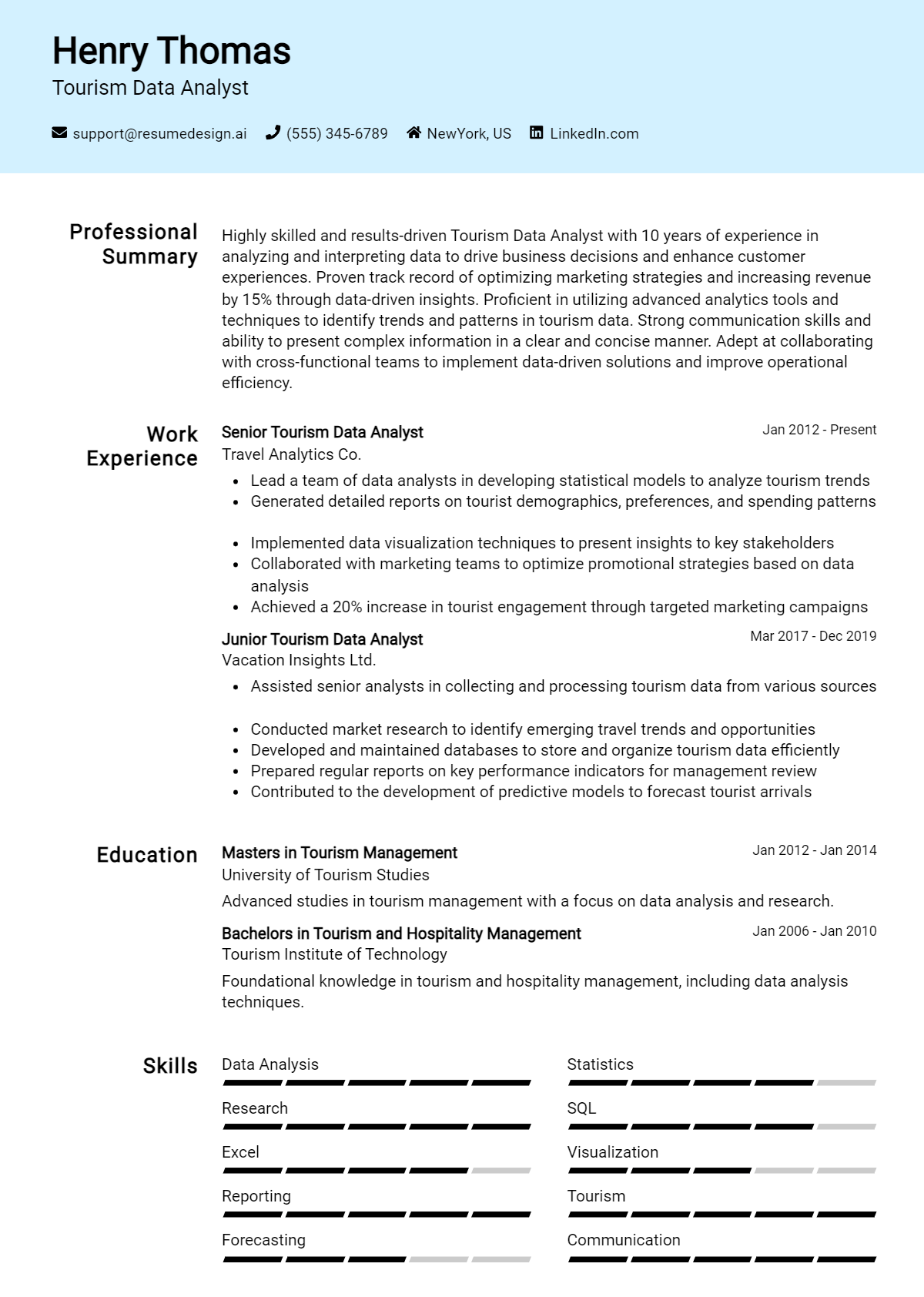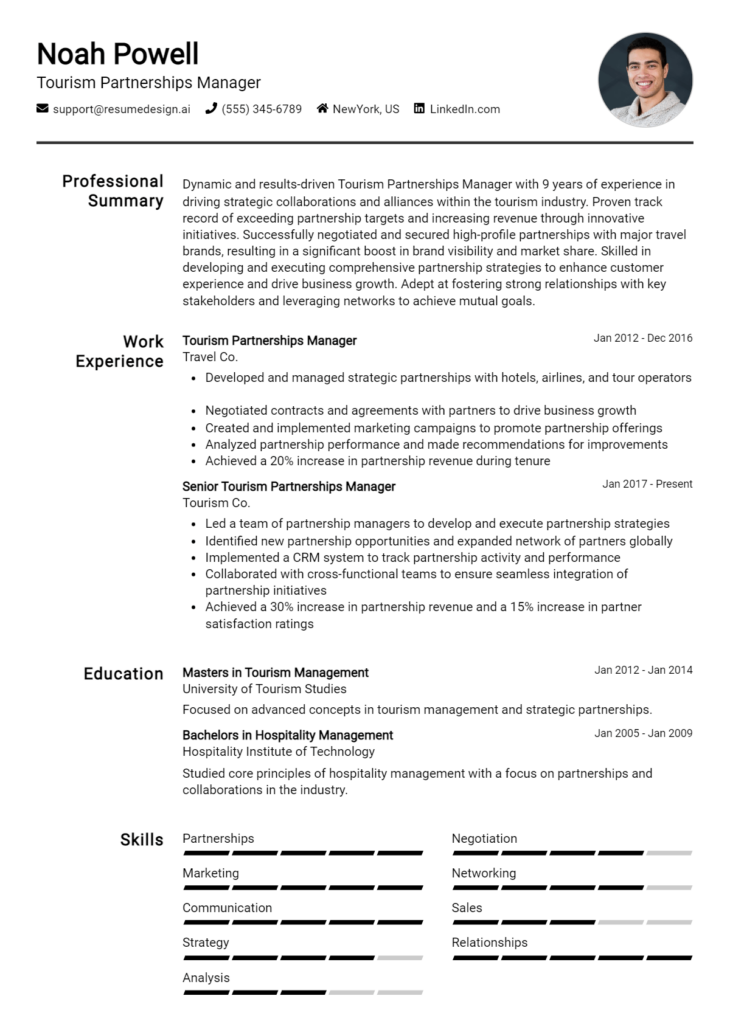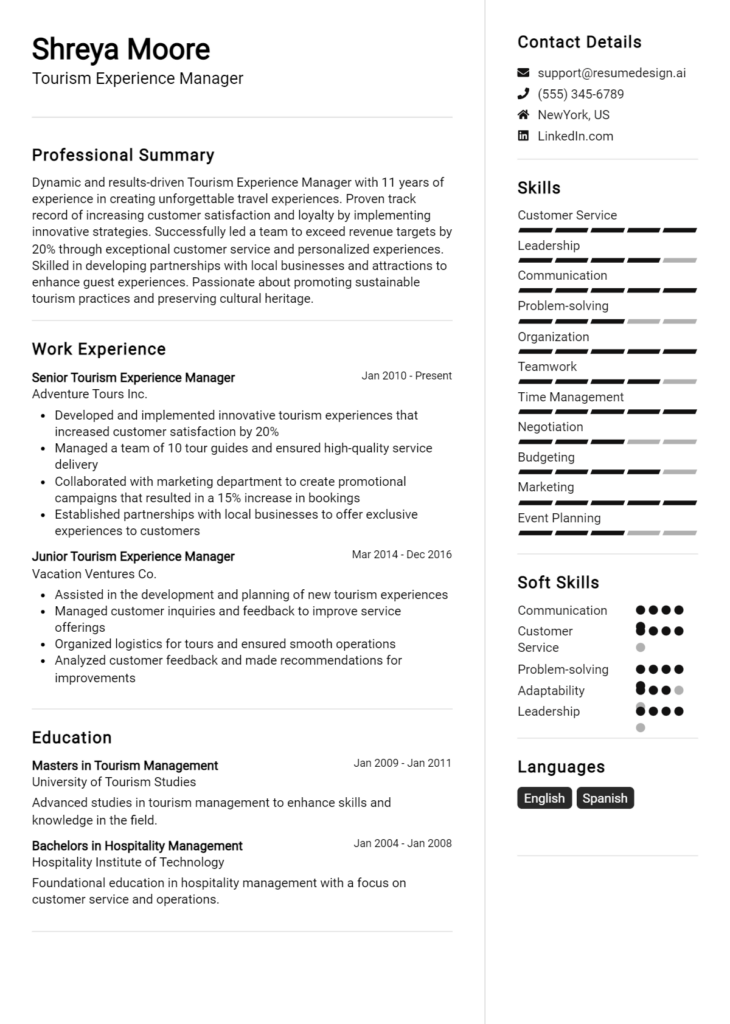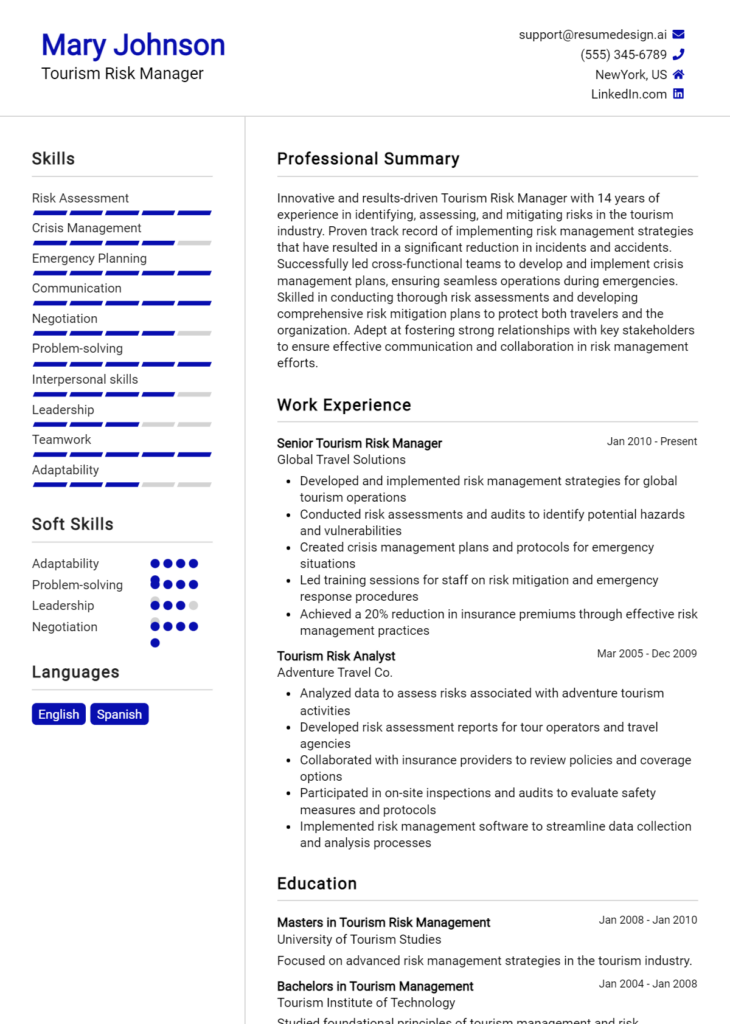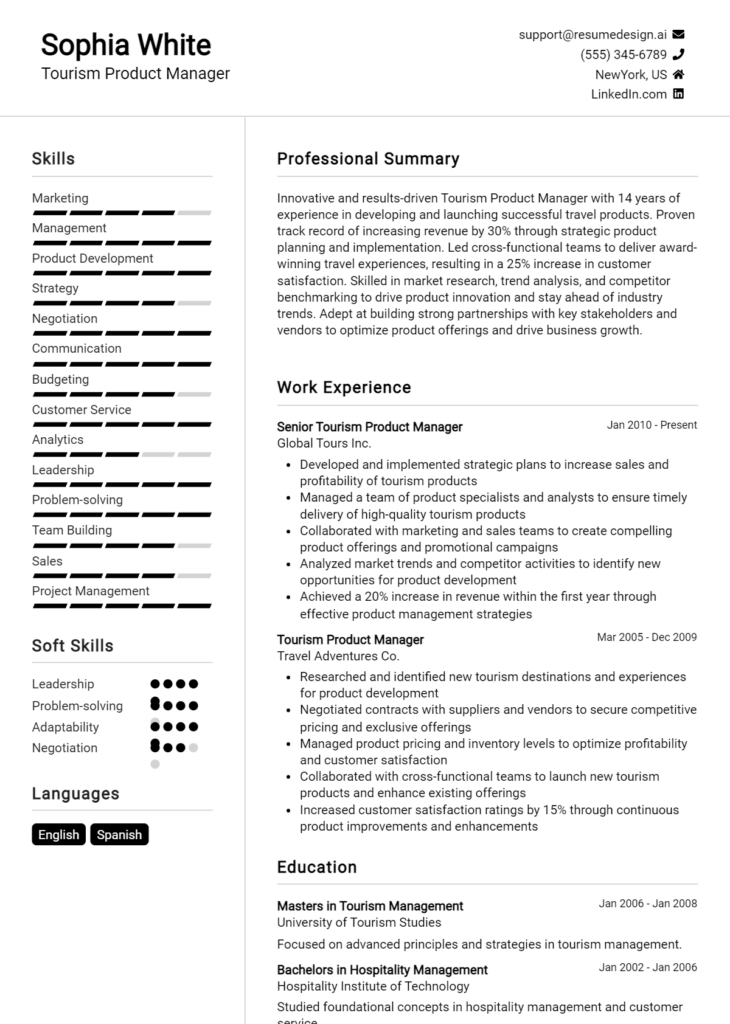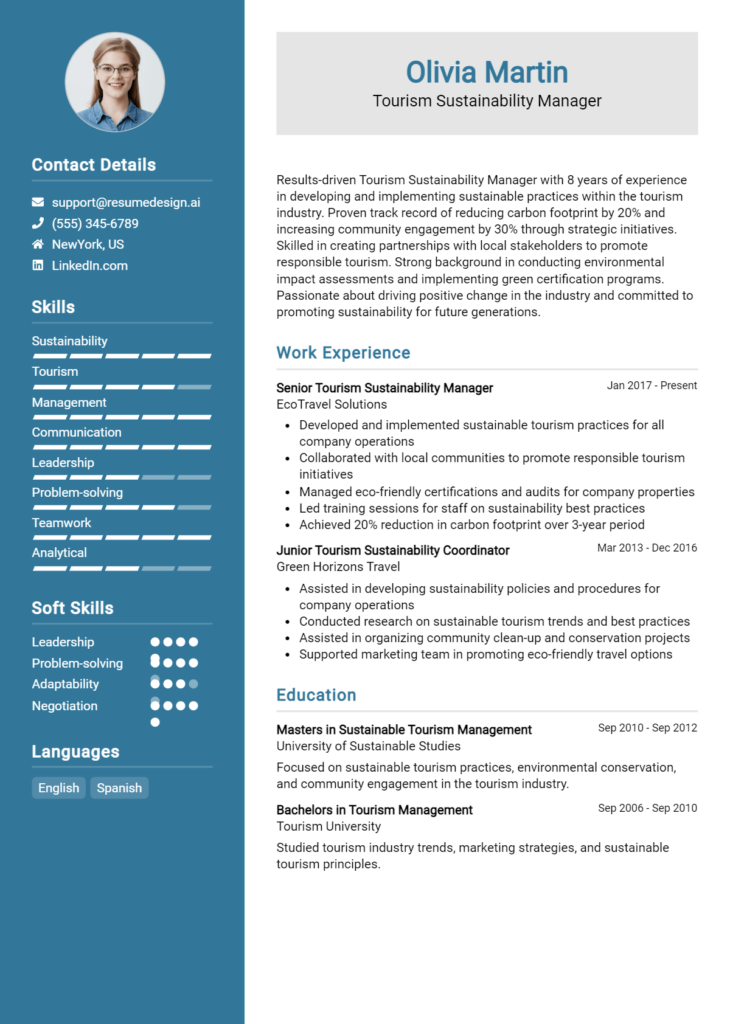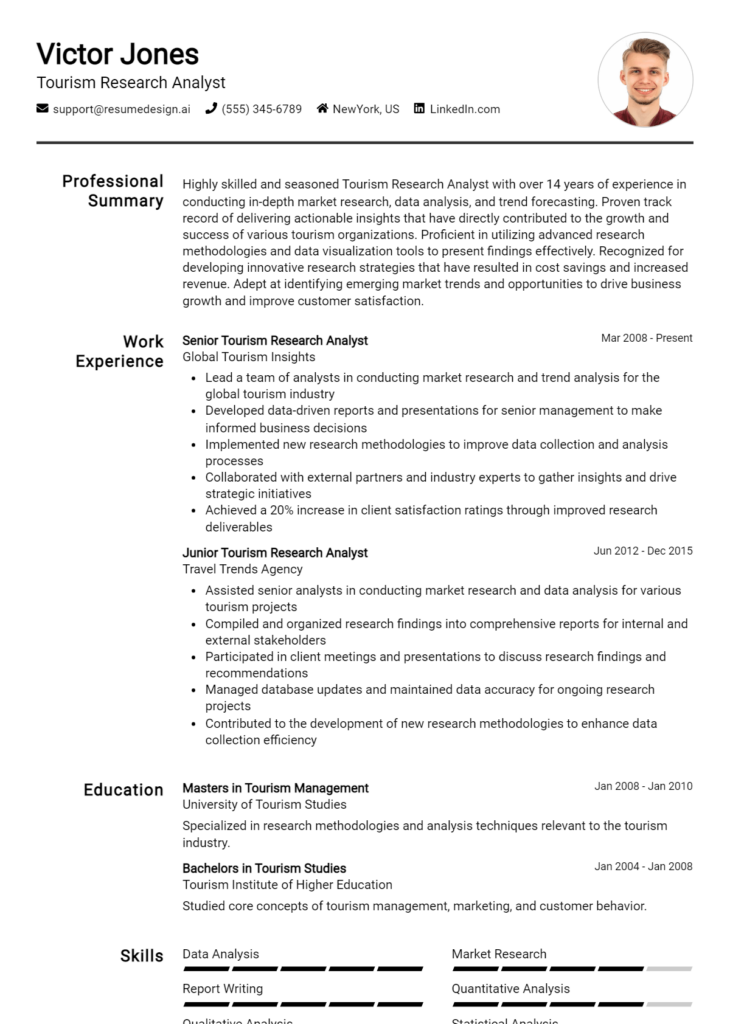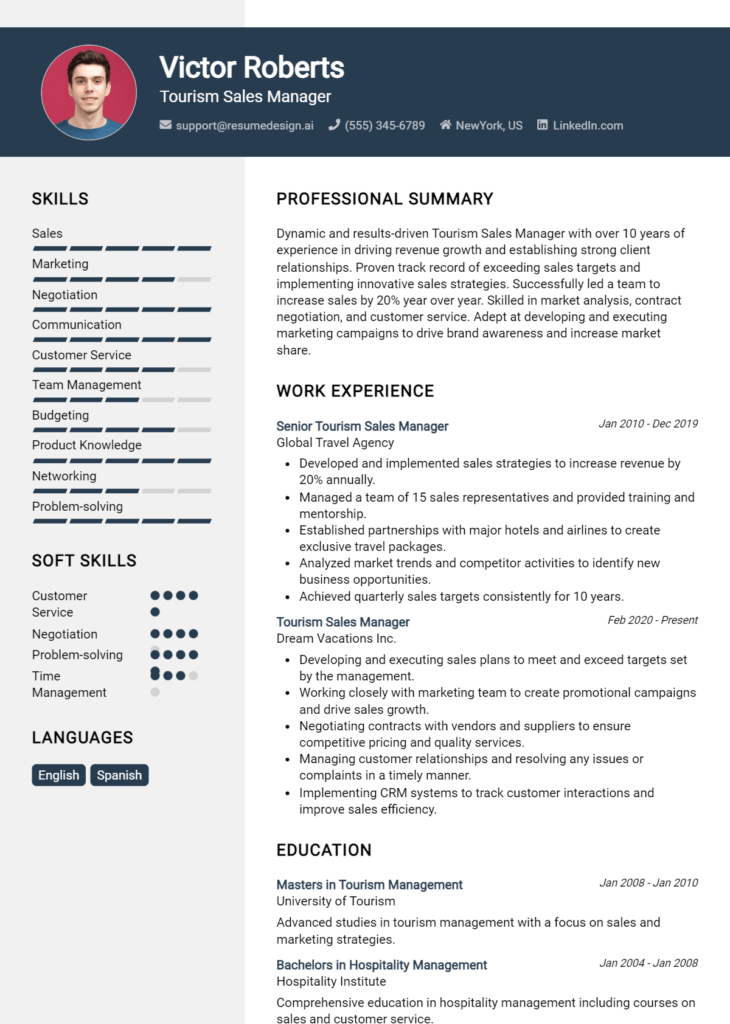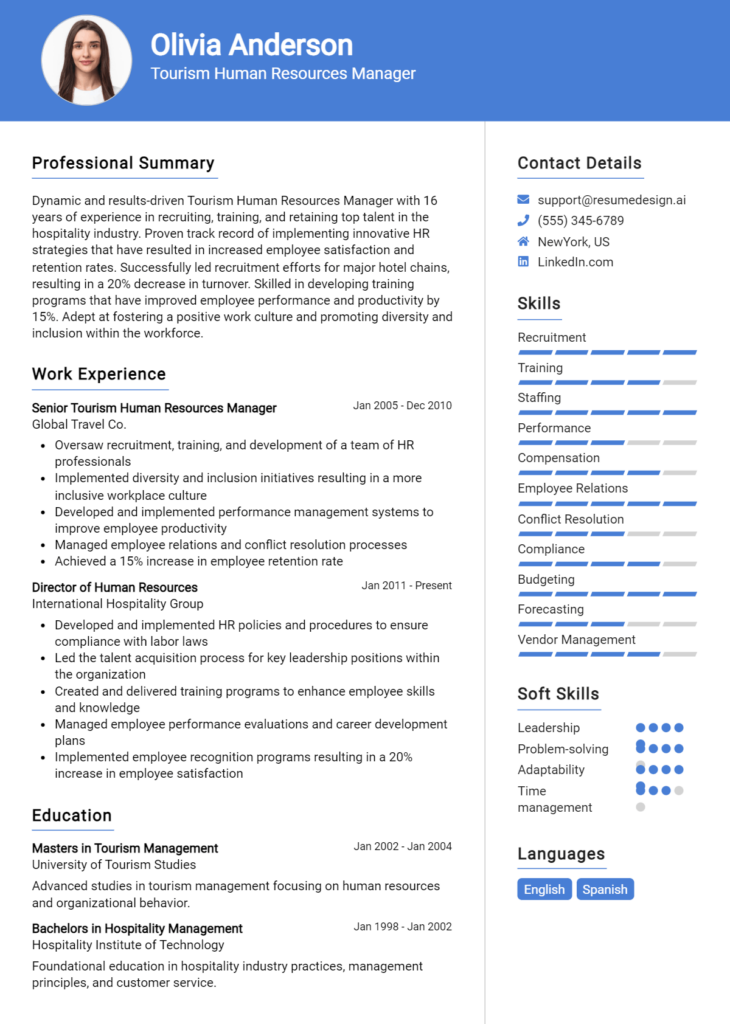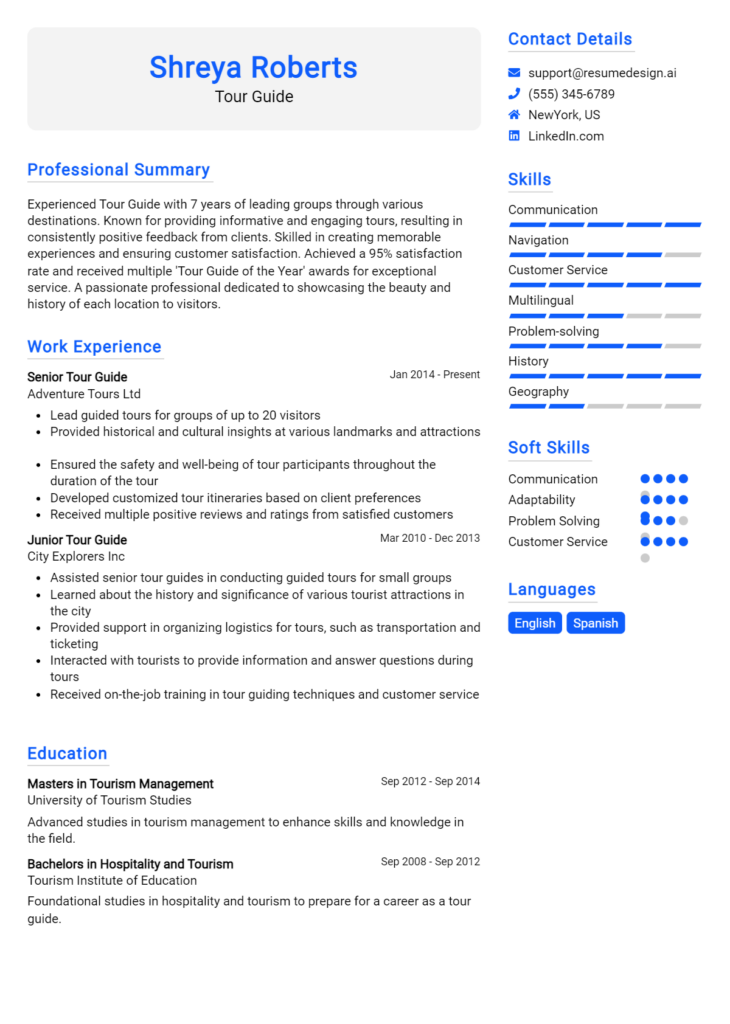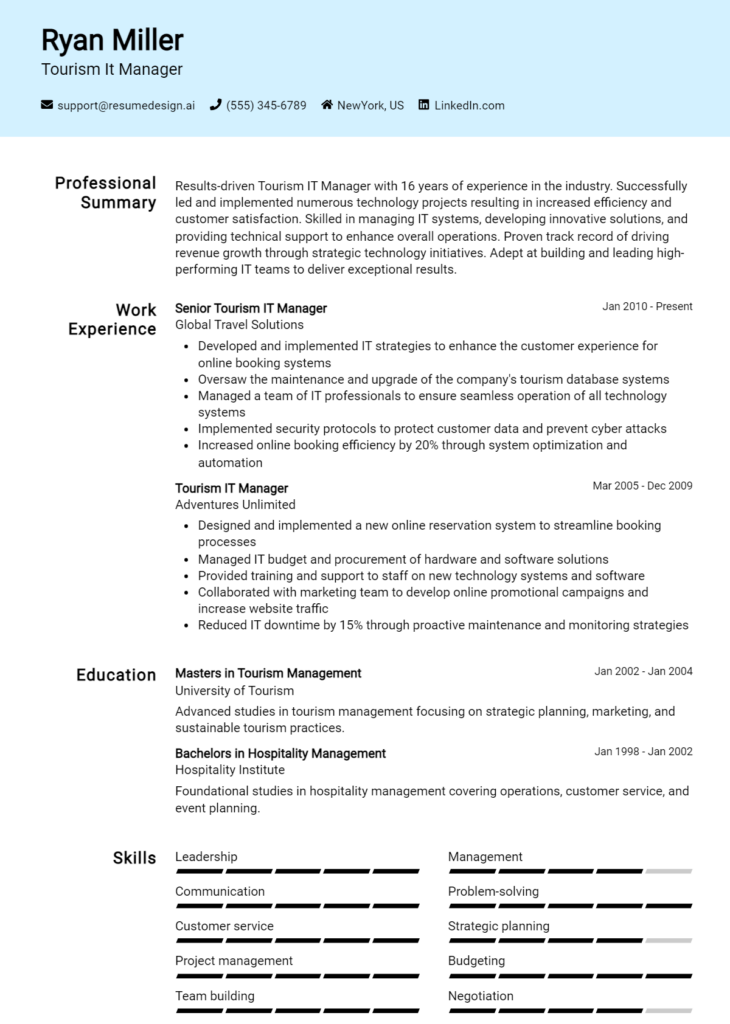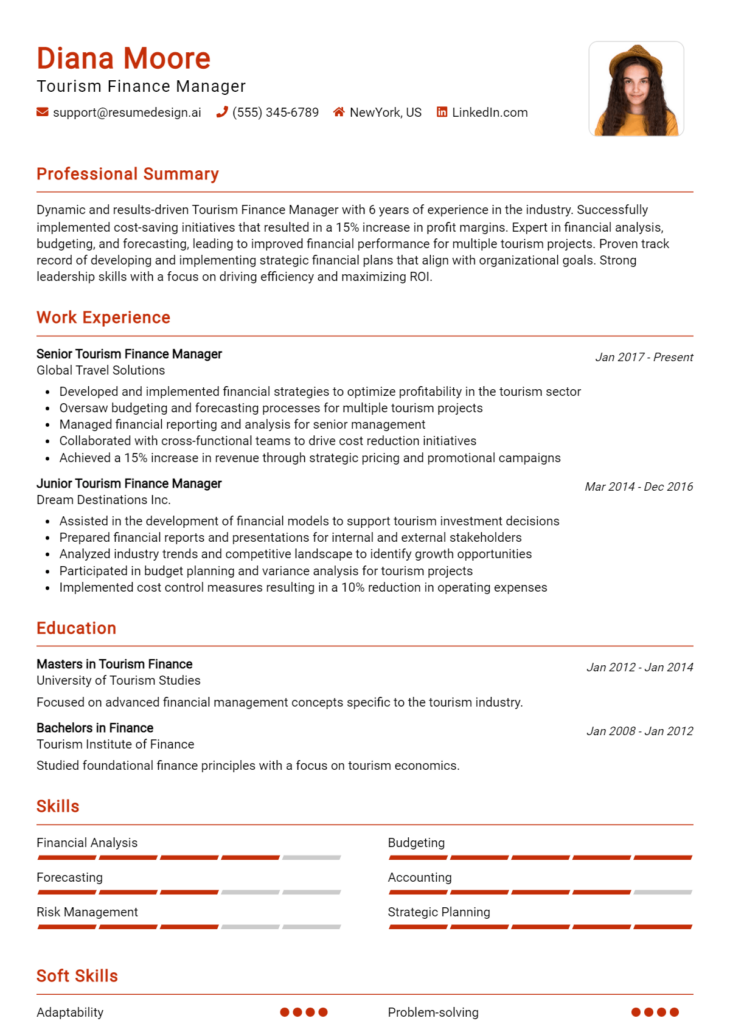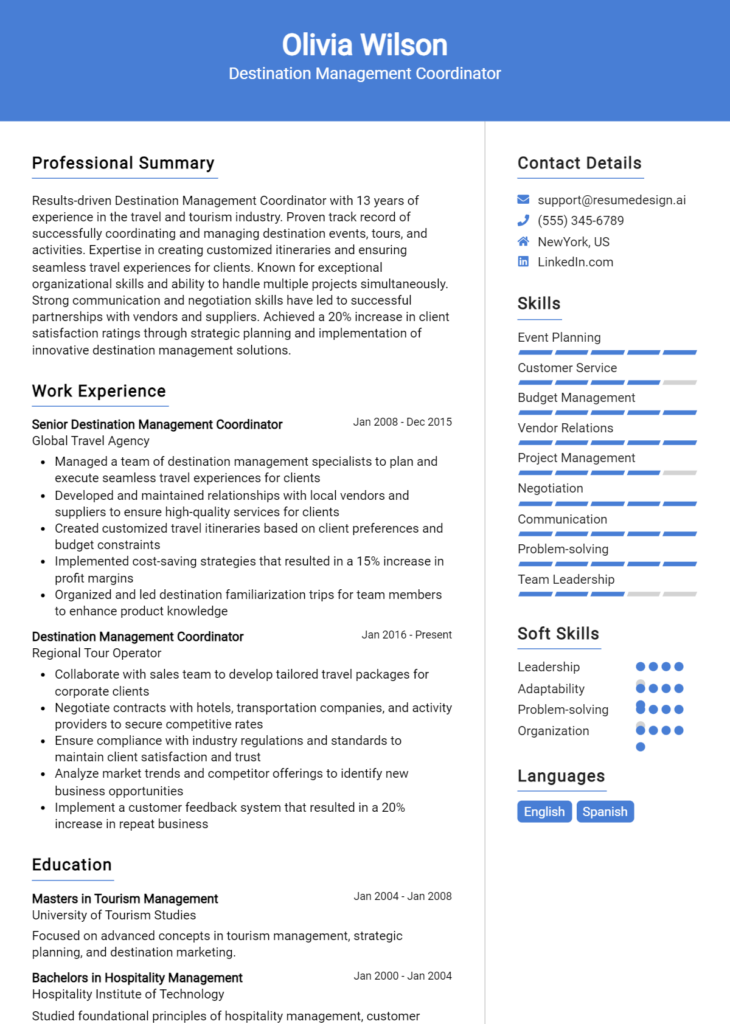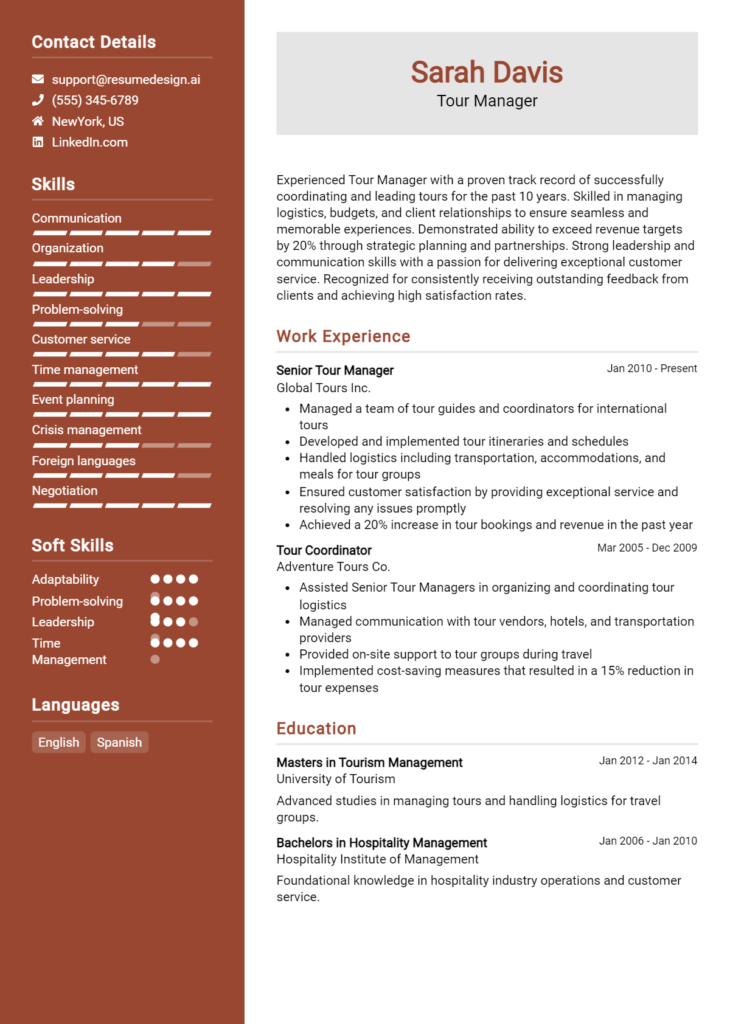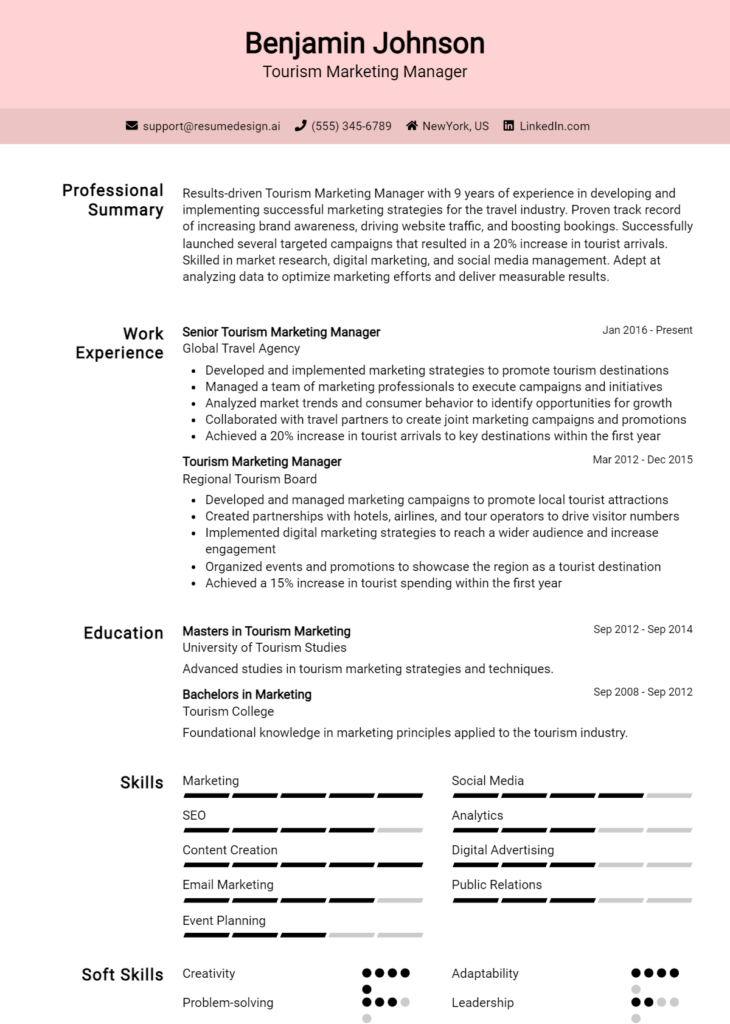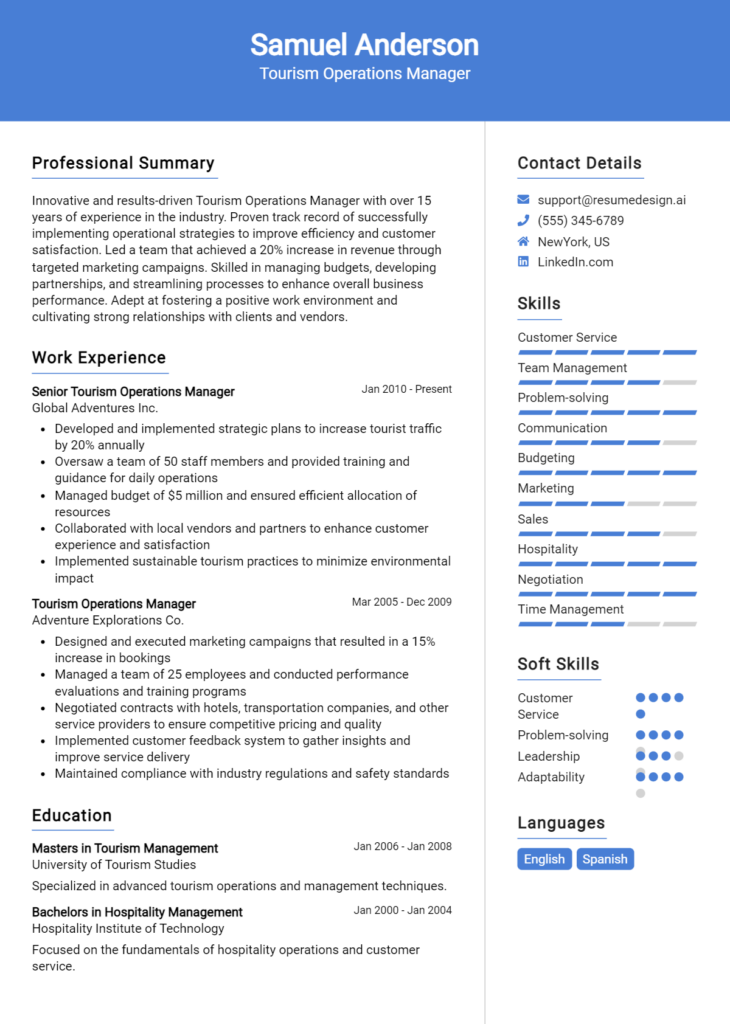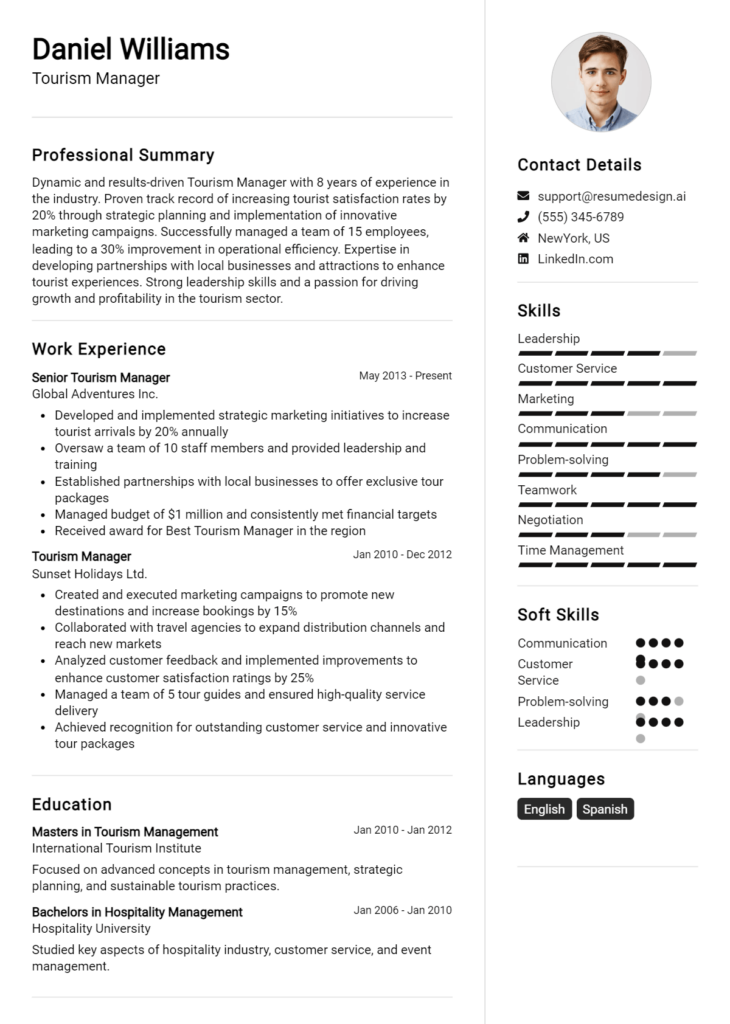Tourism Data Analyst Core Responsibilities
A Tourism Data Analyst plays a crucial role in transforming data into actionable insights that drive strategic decisions across various departments, including marketing, operations, and finance. Key responsibilities include analyzing tourism trends, forecasting visitor numbers, and evaluating marketing campaign effectiveness. Essential skills encompass technical proficiency in data analytics tools, operational understanding of tourism dynamics, and strong problem-solving capabilities. Mastering these skills not only enhances departmental collaboration but also helps achieve the organization's overarching goals. A well-structured resume can effectively highlight these qualifications, showcasing a candidate's expertise and relevance to potential employers.
Common Responsibilities Listed on Tourism Data Analyst Resume
- Analyze tourism data to identify trends and patterns.
- Develop and maintain databases for data collection and reporting.
- Generate comprehensive reports and dashboards for stakeholders.
- Collaborate with marketing teams to assess campaign performance.
- Conduct market research to inform strategic planning.
- Forecast visitor numbers and economic impacts on tourism.
- Utilize statistical software for data analysis.
- Present findings to management and recommend actionable strategies.
- Monitor industry trends and competitor activities.
- Support the development of tourism development initiatives.
- Ensure data accuracy and integrity throughout the analysis process.
- Assist in the creation of tourism policy recommendations based on data insights.
High-Level Resume Tips for Tourism Data Analyst Professionals
In the competitive landscape of tourism, a well-crafted resume is your first chance to make a lasting impression on potential employers. For Tourism Data Analyst professionals, this document is not just a list of jobs and skills; it is a showcase of your analytical prowess, industry knowledge, and the tangible impact you've made through your work. A compelling resume should reflect both your technical abilities and your achievements in a way that resonates with hiring managers. This guide will provide practical and actionable resume tips specifically tailored for Tourism Data Analyst professionals, helping you stand out in a crowded field.
Top Resume Tips for Tourism Data Analyst Professionals
- Tailor your resume to each job description by incorporating relevant keywords and phrases that align with the specific requirements of the position.
- Highlight your analytical expertise by showcasing experience with data analysis tools and software commonly used in the tourism industry, such as SQL, Tableau, or R.
- Quantify your achievements whenever possible, such as the percentage increase in visitor satisfaction or revenue growth driven by your data insights.
- Include a dedicated section for industry-specific skills, such as market research, data visualization, and predictive analytics.
- Demonstrate your familiarity with tourism trends and consumer behavior by providing examples of how your analyses have influenced strategic decisions.
- Utilize a clean and professional format that guides the reader’s eye, making it easy to identify key information quickly.
- Incorporate relevant certifications, such as Certified Analytics Professional (CAP) or Google Data Analytics, to bolster your qualifications.
- Showcase collaborative projects that demonstrate your ability to work with cross-functional teams to implement data-driven decisions.
- Use action verbs to begin each bullet point to convey a sense of proactivity and accomplishment.
- Keep your resume concise, ideally one page, focusing on the most relevant experiences and skills that pertain to the tourism data analyst role.
By implementing these tips, you can significantly enhance the effectiveness of your resume, increasing your chances of landing a job in the Tourism Data Analyst field. A targeted and well-structured resume not only highlights your technical skills but also tells a compelling story of your contributions to the tourism sector, setting you apart from the competition.
Why Resume Headlines & Titles are Important for Tourism Data Analyst
In the competitive field of tourism data analysis, having a compelling resume headline or title is crucial for making a strong first impression. A well-crafted headline can instantly capture the attention of hiring managers, summarizing a candidate's key qualifications in a concise and impactful phrase. It serves as a snapshot of the applicant's expertise and suitability for the role, allowing hiring managers to quickly assess their fit for the position. Therefore, crafting a headline that is both relevant and directly related to the job being applied for is essential for standing out in a crowded job market.
Best Practices for Crafting Resume Headlines for Tourism Data Analyst
- Keep it concise: Aim for a headline that is brief yet informative, ideally one sentence or a phrase.
- Be role-specific: Tailor the headline to reflect the specific requirements and responsibilities of a tourism data analyst.
- Highlight key skills: Incorporate important skills and competencies that are relevant to the position.
- Use impactful language: Choose strong, action-oriented words that convey confidence and expertise.
- Avoid jargon: Use clear and straightforward language that is easily understood by hiring managers.
- Include metrics when possible: If applicable, include quantifiable achievements to demonstrate your impact in previous roles.
- Align with job description: Ensure that the headline resonates with the job posting to show alignment with the employer's needs.
- Revise for clarity: Edit and refine the headline to ensure clarity and precision in conveying your professional identity.
Example Resume Headlines for Tourism Data Analyst
Strong Resume Headlines
Data-Driven Tourism Analyst with 5+ Years of Experience in Market Trends and Customer Insights
Results-Oriented Tourism Data Specialist Focused on Enhancing Visitor Experience Through Comprehensive Analytics
Skilled Data Analyst with Expertise in Tourism Metrics and Predictive Modeling for Strategic Decision Making
Weak Resume Headlines
Tourism Analyst Looking for Opportunities
Data Analyst with Some Experience
The strong headlines are effective because they clearly articulate the candidate’s specific skills, experience, and the value they bring to potential employers in the tourism sector. They are tailored to the role, provide a clear picture of the candidate's qualifications, and use compelling language that resonates with hiring managers. In contrast, the weak headlines fail to impress due to their vague nature and lack of specific information, making it difficult for hiring managers to gauge the candidate's fit for the position. A strong, targeted headline can make all the difference in attracting attention and prompting further review of the resume.
Writing an Exceptional Tourism Data Analyst Resume Summary
A well-crafted resume summary is crucial for a Tourism Data Analyst, as it serves as the first impression and a snapshot of your professional profile. This brief section allows candidates to succinctly showcase their key skills, relevant experience, and noteworthy accomplishments, capturing the attention of hiring managers swiftly. A strong summary not only highlights what makes the candidate unique but also aligns closely with the specific job they are applying for, ensuring that it resonates with potential employers. By being concise and impactful, a compelling resume summary can set the tone for the rest of the resume, making it an essential component in the competitive field of tourism data analysis.
Best Practices for Writing a Tourism Data Analyst Resume Summary
- Quantify Achievements: Use specific numbers or percentages to demonstrate your impact and accomplishments.
- Focus on Relevant Skills: Highlight key skills that align with the job description, such as data analysis, statistical software proficiency, or market research expertise.
- Tailor the Summary: Customize your summary for each job application to reflect the specific requirements and preferences of the employer.
- Use Action Verbs: Start sentences with strong action verbs to convey your contributions effectively.
- Keep it Concise: Aim for 2-4 sentences that provide a clear overview without overwhelming the reader.
- Highlight Industry Knowledge: Showcase your understanding of tourism trends, data interpretation, and customer behavior analysis.
- Showcase Technical Proficiencies: Mention relevant software tools and technologies that you are skilled in, such as Excel, SQL, or Tableau.
- Demonstrate Problem-Solving Skills: Include examples of how your analysis led to actionable insights or strategic improvements.
Example Tourism Data Analyst Resume Summaries
Strong Resume Summaries
Data-driven Tourism Analyst with over 5 years of experience in leveraging analytics to enhance customer experiences and optimize operational efficiency. Achieved a 30% increase in tourist engagement through targeted marketing strategies, utilizing advanced statistical software to analyze visitor data trends.
Results-oriented Analyst with a proven track record of improving tourist satisfaction by 25% through insightful data interpretation and trend analysis. Proficient in SQL and Tableau, effectively translating complex datasets into actionable reports for stakeholders.
Dynamic Tourism Data Analyst skilled in identifying market opportunities through in-depth data analysis and research. Successfully increased revenue by 15% for a leading travel agency by implementing data-driven marketing initiatives based on customer behavior insights.
Weak Resume Summaries
Enthusiastic data analyst with experience in the tourism sector looking for new opportunities. Good with numbers and analysis.
Tourism analyst with a background in data analysis. Eager to learn and grow in the field.
The strong resume summaries are effective because they provide concrete examples of achievements and specific skills, demonstrating how the candidates have added value in previous roles. They use quantifiable results to illustrate impact and directly relate to the responsibilities expected in a Tourism Data Analyst position. In contrast, the weak summaries lack detail and specificity, making them generic and less appealing to hiring managers who are looking for candidates with proven results and a clear understanding of the role’s demands.
Work Experience Section for Tourism Data Analyst Resume
The work experience section of a Tourism Data Analyst resume is critical as it serves as a testament to the candidate's practical application of technical skills and their ability to manage teams effectively while delivering high-quality products. This section not only highlights relevant experience but also allows candidates to showcase their achievements in a quantifiable manner, aligning their background with industry standards. By demonstrating expertise in data analysis, project management, and collaboration with cross-functional teams, candidates can present themselves as valuable assets to potential employers.
Best Practices for Tourism Data Analyst Work Experience
- Emphasize technical skills such as data analytics software proficiency (e.g., SQL, R, Python).
- Quantify achievements by including specific metrics (e.g., increased tourist engagement by 20%).
- Highlight collaborative projects that illustrate teamwork and leadership capabilities.
- Use action verbs to describe responsibilities and contributions (e.g., "developed," "analyzed," "implemented").
- Align experiences with industry trends and standards to demonstrate relevance.
- Include any certifications or specialized training that bolster your expertise in tourism data analysis.
- Tailor your work experience to the specific job description to emphasize the most relevant achievements.
- Maintain clarity and conciseness to ensure easy readability and understanding of your achievements.
Example Work Experiences for Tourism Data Analyst
Strong Experiences
- Led a team of data analysts to develop a predictive model that improved tourist arrival forecasts by 30%, directly influencing marketing strategies.
- Implemented a new data visualization tool that reduced reporting time by 50%, enhancing decision-making processes for stakeholders.
- Collaborated with the marketing team to analyze customer demographics, resulting in a 25% increase in targeted campaign efficiency.
- Conducted a comprehensive analysis of seasonal travel trends, which contributed to a 15% increase in off-peak tourist engagement through tailored promotions.
Weak Experiences
- Worked on various data-related tasks.
- Assisted in the collection of data for reports.
- Participated in team meetings regarding tourism data.
- Helped with general data analysis without specific outcomes mentioned.
The examples listed as strong experiences demonstrate clear, quantifiable outcomes and leadership in technical projects, showcasing the candidate's ability to drive results and collaborate effectively. In contrast, the weak experiences lack specificity and measurable achievements, making it difficult for potential employers to assess the candidate's impact or skills in the field. Strong experiences provide a compelling narrative of professional competence, while weak experiences leave much to be desired in terms of detail and relevance.
Education and Certifications Section for Tourism Data Analyst Resume
The education and certifications section of a Tourism Data Analyst resume plays a crucial role in demonstrating a candidate's academic qualifications and industry expertise. It serves as a testament to the candidate’s commitment to continuous learning and professional development. By including relevant coursework, certifications, and specialized training, candidates can significantly enhance their credibility and show how their background aligns with the specific demands of the tourism data analysis field. This section not only highlights formal education but also showcases skills that are directly applicable to analyzing tourism trends, consumer behavior, and data-driven decision-making processes.
Best Practices for Tourism Data Analyst Education and Certifications
- Focus on relevant degrees such as Statistics, Data Science, or Hospitality Management.
- Include industry-recognized certifications, like Certified Analytics Professional (CAP) or Google Data Analytics.
- Detail relevant coursework that pertains to data analysis, tourism economics, or market research.
- Highlight any specialized training in data visualization tools such as Tableau or Power BI.
- Keep descriptions concise while ensuring they clearly convey applicability to the role.
- Update the section regularly to reflect new qualifications or continuous learning experiences.
- Include any notable projects or research conducted during education that relate to tourism data analysis.
- Consider adding a brief summary of academic achievements, such as honors or scholarships, if relevant.
Example Education and Certifications for Tourism Data Analyst
Strong Examples
- Bachelor of Science in Data Science, University of Tourism Analytics, 2020
- Certified Analytics Professional (CAP), 2021
- Relevant Coursework: Data Visualization Techniques, Predictive Analytics for Tourism, and Geographic Information Systems (GIS)
- Google Data Analytics Professional Certificate, 2022
Weak Examples
- Bachelor of Arts in English Literature, 2018
- Certification in Basic Computer Skills, 2019
- Relevant Coursework: Introduction to Art History
- Certification in Microsoft Office Suite, 2020
The examples provided are considered strong because they directly relate to the skills and knowledge necessary for a Tourism Data Analyst role, showcasing relevant degrees, certifications, and coursework that align with industry needs. In contrast, the weak examples lack relevance to the tourism data analysis field, focusing on outdated or unrelated qualifications that do not contribute to the candidate's suitability for the role.
Top Skills & Keywords for Tourism Data Analyst Resume
As a Tourism Data Analyst, the combination of hard and soft skills is crucial for effectively analyzing and interpreting data that drives decision-making in the tourism industry. A well-crafted resume that highlights these skills can set candidates apart in a competitive job market. Employers seek individuals who not only possess technical expertise but also demonstrate strong interpersonal and analytical abilities. By showcasing the right skills, candidates can articulate their value to potential employers, ensuring they are seen as capable of translating complex data into actionable insights that can enhance tourism experiences and drive business growth.
Top Hard & Soft Skills for Tourism Data Analyst
Soft Skills
- Analytical Thinking
- Communication Skills
- Problem-Solving
- Attention to Detail
- Adaptability
- Team Collaboration
- Time Management
- Critical Thinking
- Creativity
- Customer Service Orientation
Hard Skills
- Data Analysis
- Statistical Software Proficiency (e.g., R, SAS, SPSS)
- Data Visualization Tools (e.g., Tableau, Power BI)
- Geographic Information Systems (GIS)
- Database Management (e.g., SQL)
- Excel Advanced Functions
- Market Research Techniques
- Forecasting and Modeling
- Report Writing
- Knowledge of Tourism Industry Trends
For more on how to effectively highlight your skills and work experience, consider tailoring your resume to reflect both your technical capabilities and your unique contributions to previous roles.
Stand Out with a Winning Tourism Data Analyst Cover Letter
As a dedicated and detail-oriented Tourism Data Analyst, I am excited to apply for the position at [Company Name]. With a robust background in data analysis and a passion for the tourism industry, I have developed a keen ability to transform complex datasets into actionable insights that drive marketing strategies and enhance customer experiences. My experience working with various data visualization tools and statistical software, combined with my strong analytical skills, positions me as a valuable asset to your team.
In my previous role at [Previous Company Name], I successfully led a project that analyzed visitor trends and spending patterns, which resulted in a 15% increase in targeted marketing effectiveness. By utilizing advanced data analysis techniques, I identified key demographics and preferences that allowed the company to tailor their offerings, leading to higher customer satisfaction and increased revenue. I am adept at interpreting large data sets and translating them into concise reports that inform strategic decision-making, ensuring that stakeholders have the insights needed to excel in a competitive market.
Collaboration is at the heart of my work ethic. I believe that effective communication with cross-functional teams is essential to leverage data for impactful tourism initiatives. I have worked closely with marketing and operations teams to develop and implement data-driven strategies that enhance the overall visitor experience. My ability to present complex data in an easily digestible manner has allowed me to engage diverse audiences, fostering a culture of data-driven decision-making within the organization.
I am eager to bring my expertise in data analysis, along with my passion for tourism, to [Company Name]. I am particularly impressed by your commitment to leveraging data for sustainable tourism practices and would be thrilled to contribute to such innovative initiatives. Thank you for considering my application. I look forward to the opportunity to discuss how my skills and experiences align with the goals of your team.
Common Mistakes to Avoid in a Tourism Data Analyst Resume
When crafting a resume for a Tourism Data Analyst position, it's essential to present your skills and experiences accurately and compellingly. However, many candidates make common mistakes that can undermine their chances of landing an interview. Understanding these pitfalls can help you create a more effective resume that highlights your qualifications. Here are some frequent errors to avoid:
Lack of Specificity: Vague descriptions of previous roles can leave hiring managers confused about your actual responsibilities and accomplishments. Be specific about your contributions and the impact of your work.
Ignoring Relevant Skills: Failing to highlight key data analysis tools and techniques relevant to the tourism industry, such as SQL, R, or Python, can make your resume less appealing. Tailor your skills section to include those most relevant to the job.
Overloading with Technical Jargon: While technical skills are important, excessive jargon can alienate non-technical hiring managers. Aim for a balance that communicates your expertise without overwhelming the reader.
Neglecting Quantifiable Achievements: Resumes should showcase measurable successes, such as percentage increases in visitor engagement or revenue growth through data-driven strategies. Quantifying your achievements provides concrete evidence of your capabilities.
Using a Generic Template: Submitting a one-size-fits-all resume can signal a lack of genuine interest in the position. Customize your resume for each application to reflect the specific requirements and culture of the employer.
Ignoring Formatting Consistency: Disorganized formatting can distract from your qualifications. Ensure that fonts, sizes, and bullet points are consistent throughout your resume for a polished appearance.
Omitting Soft Skills: While technical skills are critical, soft skills such as communication, teamwork, and problem-solving are equally important in a data analyst role. Highlight these qualities to demonstrate your ability to work collaboratively in a tourism setting.
Failing to Proofread: Spelling and grammatical errors can create a negative impression and suggest a lack of attention to detail. Always proofread your resume multiple times and consider having someone else review it as well.
Conclusion
As we explored the pivotal role of a Tourism Data Analyst, it is clear that this position is vital for interpreting trends and insights that drive the tourism industry. A successful Tourism Data Analyst not only needs a strong analytical skill set but also a solid foundation in statistics and familiarity with data visualization tools. Furthermore, having expertise in software such as SQL and Excel, along with knowledge of travel industry dynamics, is crucial for effective data interpretation and decision-making.
In today’s competitive job market, your resume must effectively showcase your skills and experiences to stand out. It’s essential to highlight your analytical abilities, technical proficiencies, and any relevant projects you have completed. Tailoring your resume to emphasize your accomplishments in data-driven decision-making can significantly enhance your chances of landing that dream job.
Now is the perfect time to review and update your Tourism Data Analyst resume. Don't miss out on the opportunity to present yourself as the ideal candidate. Utilize available resources such as resume templates, which offer a variety of formats to choose from, or the resume builder that guides you through creating a professional document. For inspiration, check out resume examples that showcase successful Tourism Data Analysts, and don’t forget to craft a compelling cover letter with the help of cover letter templates.
Take action today—revamp your resume and position yourself for success in the tourism data field!

